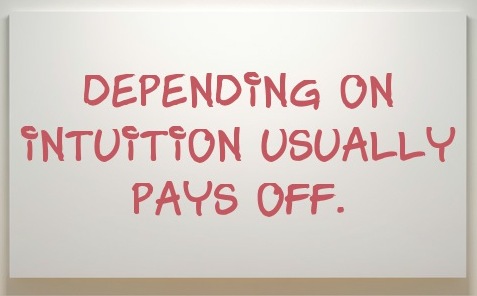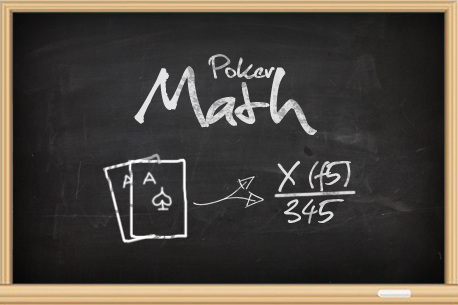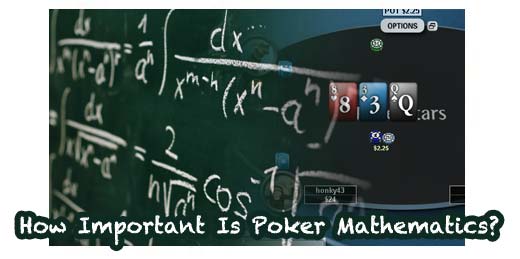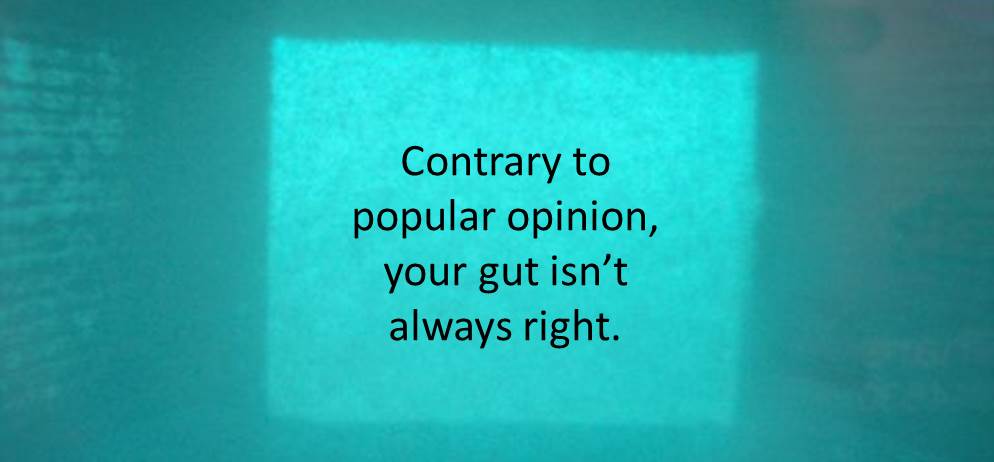First of all – you can't calculate everything
No matter how powerful a computer or formulas you have, it is simply impossible to create an effective game optimization theory that would always allow you to make the most logical and best decision. There are so many variations that it is simply physically impossible to count them all.
 If you don't use programs and play multi-table poker, then you have to perform dozens, if not hundreds, of calculations and make dozens of decisions in your head per minute. Therefore, you must understand that you simply won't be able to mathematically justify all decisions and sometimes you will just have to rely on intuition, hoping that the decision made will be the most correct.
If you don't use programs and play multi-table poker, then you have to perform dozens, if not hundreds, of calculations and make dozens of decisions in your head per minute. Therefore, you must understand that you simply won't be able to mathematically justify all decisions and sometimes you will just have to rely on intuition, hoping that the decision made will be the most correct.
If you still try to calculate, you won't have enough time, because the time for a move in poker is limited. Therefore, all top-level players try to gather as much information as possible to rely less on BLIND intuition and feel decisions based on probabilities and the information gathered about other players.
Where is the best place to play poker?
Secondly – intuition often hides mathematics
There is an unofficial opinion that jazz musicians are the best improvisers in the world. Since their music almost never has any written notes or set rhythms (it constantly changes), most jazz musicians improvise and play what comes to mind. So to speak, they follow their intuition. However, among jazz musicians themselves, there is a popular saying – “There is no better improvisation than a rehearsed improvisation.” So even the greatest improvisers rehearse, learn, improve, and prepare, read the situation, and look for solutions to it, not just act as they see fit at the moment.

In this aspect, similarities can be found between two very different things, poker and jazz. It is convenient and easy for players to rely on intuition. Moreover, successful intuition decisions can create the most beautiful and Hollywood-like game moments, but in the long run, playing many rounds, it is necessary to rely on mathematics, otherwise, you will often fall into bluff traps and overestimate your ability to read situations. Mathematics is especially important in preflop situations, where the foundation for the further game is laid. Later, you have to guess and calculate the possibilities of only a few (but at least not all) opponents.
How to get the maximum benefit during real games?
If the greatest mathematician and the greatest oracle played at the poker table, it is very likely that the oracle could win one or two matches. However, the more and the longer they played, the more competitions the mathematician would win. No matter how much you want to win, relying on instincts does not overcome probability theories and mathematically based calculations. Minimizing losses, you can stay at the poker table longer than going All-in every other move.

According to poker players, intuition at the table brings benefits only when the player has knowledge and experience. In general, it is not worth relying on intuition and feelings if the player is a beginner or not very experienced. After all, intuition is born when we make conclusions about the environment around us. Therefore, intuition is more accurate when those conclusions are more accurate, and the accuracy of conclusions directly depends on our insight. Therefore, looking at professional players can create a false impression that they are just guessing what is happening. After all, there is so much talk at the table that it is difficult to understand that behind all this lies a lot of calculations and reflections.
All experienced poker players will unanimously agree that it is necessary to know at least the basics of poker probability mathematics to increase your success at the real game table. Otherwise, the probability of silly and avoidable mistakes simply increases unnecessarily. There are several areas and formulas that can be applied in real game conditions to increase the probability of success.
The optimal game (for beginners)
Inexperienced players should rely on intuition no more than 5% of their hands. Why? Because doing so more often will simply increase the probability of losing as their game instincts are simply not sharp enough to know at which stage, which player will dare to bluff, and who will constantly make bully maneuvers and try to easily collect small winnings.

The best thing you can do when playing remotely is to play for very small amounts and improve your skills using poker programs. This way, you will gradually gain intuition for game situations and understand your mistakes and see which ones you make most often. Relying more on calculations and not rushing will reduce the number of mistakes, so you won't lose much, and that should be the main goal of every beginner player.
The optimal game (for experienced players)
Experienced players can already think about earnings or results. Everyone wants to win, but everyone also uses a unique, individual strategy to achieve this. We have quiet and calculating players, we have those who act somewhat irrationally, taking a lot of risks. However, both types of players can be winners, it all depends on how they use their strengths and how well they can mask their weaknesses. You don't need to think too much about masking if you use a poker program. Then it calculates all the risks itself, identifies mistakes, and helps to take advantage of opponents' mistakes, guaranteeing maximum benefit during the game.
Try PokerTracker4 for free!
Try HoldemManager3 for free!
Try GTO Trainer for free!
Experienced players can rely on intuition more than mathematics up to 25% of the time, but it is not recommended to risk driven only by intuition more than 10-15% of hands. Sometimes mathematical formulas urge you to fold. However, even experienced players should not wait for intuition to reach them. As soon as the cards are drawn and seen, intuition speaks and, according to statistics, ~75-95% of the time it is right.
Tačiau būtent dėl tų 5 papildomų procentų, kurių trūksta iki viso šimto, ilguoju laikotarpiu sausa matematika vis vien laimi, nes tikimybių teorija yra pats stipriausias ginklas ir pačios galingiausios žinios, kurias pokerio žaidėjas gali turėti savo arsenale. Kaip gerai, kad dabar jų mokytis nuo A iki Ž nebūtina, jei turite pokerio programą, kuri viską kalkuliuoja už jus.
Pavyzdžiai iš realių žaidimo situacijų
Kad ir kokios situacijos žaidimo eigoje pasitaiko, matematinės tikimybės labiausiai taikomos tuomet, kai žaidėjas bando surinkti tam tikrą kombinaciją, tačiau jos dar neturi arba kai įtaria, kad tą patį daro jo oponentai. Taigi, dažniausiai tikimybes skaičiuojame tuomet, kai žaidėjas taikosi į flush arba straight kombinacijas.
Nepamirškite, kad užtenka žinoti tik pagrindinius dalykus. Pot odds, EV (expected value) ir equity yra tos trys formulės, kurios sudaro maždaug 90% visos matematikos pokeryje.
EV (expected value)
Apie kiekvieną iš šių formulių galite rasti daug informacijos internete. Vardan to, kad turinys būtų maksimaliai naudingas, apžvelkime vieną iš svarbiausių matematinių funkcijų – blefo tikimybę. Tarkime, kad likote dviese, prieš kitą oponentą, kuris blefuoja 1 kartą iš 5, kuomet turi geriausią kombinaciją po river. Keturis kartus jis neblefuoja.
Tai reiškia, kad turime 20% tikimybę (1 iš 5), jog mūsų rankose yra geresnės kortos. Būtent tokia tikimybė, kad jis blefuoja. Todėl, paraleliai jau minėtam skaičiavimui – yra maždaug 80% tikimybė (4 iš 5), kad mes neturime geriausios kortų kombinacijos. Todėl laimėsime po kartą už kiekvienus keturis pralaimėjimus. Tarkime, kad, jeigu turėsime geriausią kombinaciją, laimėsime 25€, tačiau, jeigu atsakę į statymą (call) pralaimėsime, tuomet patirsime 6€ nuostolį. Tai reiškia, kad po 5 kartų laimėsime 25€, tačiau pralaimėsime 24€. Todėl, pagal bendrą teoriją, atsakydami į kiekvieną statymą turėsime 1€ pelną po penkių hand‘ų. Taigi, nors nauda – maža, bet, reiškiasi, kad mums apsimoka atsakyti į statymą.
Galbūt sunku suprasti tekstinį aprašymą. Tuomet pasižiūrėkite šį vaizdo įrašą YouTube, kuris aiškiai parodys svarbiausią informaciją apie pot odds.
Pot odds
Išvados
Išnagrinėjus realias situacijas bei žinant statistiką galime teigti, kad pasitikėti vien tik intuicija patariama ne dažniau nei 10% kartų. Visus kitus kartus intuicija išplaukia dėka racionalių išvadų, kurias galime sugeneruoti naudodami paprastas matematines formules, tokias kaip pot odds. Todėl geriau pokeryje pasikliauti nuobodžia statistika ir tik, kai turite pakankamai patirties, improvizuoti, kuomet nuojauta kužda, kad tai bus geriausias sprendimas.






